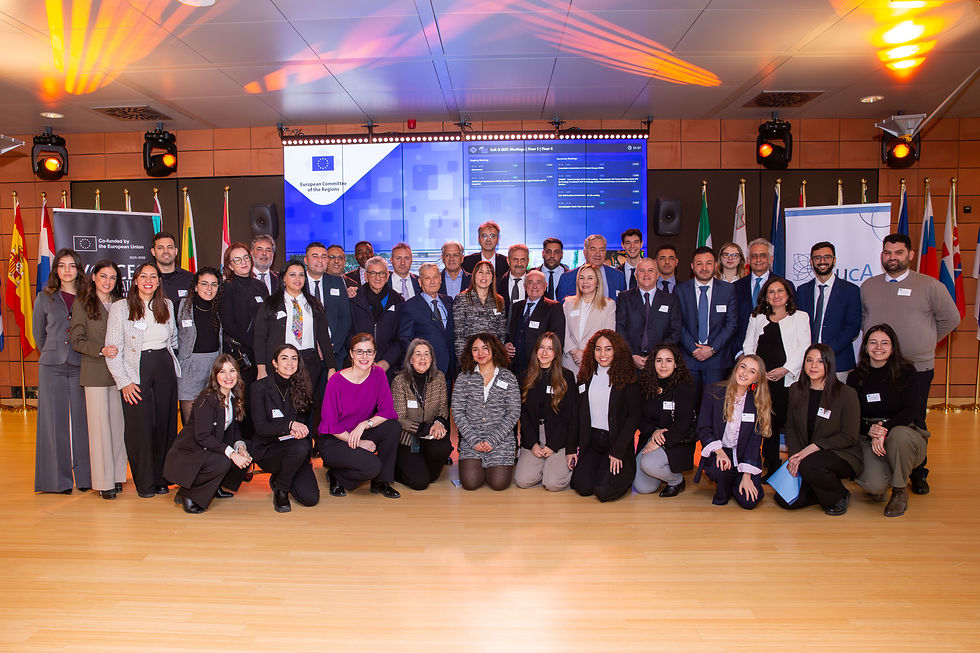VOICES From Migrations | Giuseppina Garofalo's story
- Changemakers
- Jul 2, 2025
- 3 min read
Updated: Aug 12, 2025
“VOICES From Migrations” is a project co-funded by the European Union that gives voice to the untold stories of migrants. Giuseppina Garofalo moved from Italy to Belgium in the 1970s and experienced the development of the European Union first-hand. This is her story.

“My name is Giusi, I am 74 years old. I come from Trieste and, since I was 23, I have lived in Belgium.
In Trieste, in fact, I was a bit of a foreigner: my father was Sicilian and my mother was from Lombardy, and because of these origins, talking about belonging is difficult. I was born in Chiari, in Lombardy. At the age of 4, I moved to Trento, then, at the age of 5, to Trieste. And I stayed there until I was 23.
I started thinking about leaving Italy when I began university, but I didn't know how to do it. So I decided to learn languages: if I learned them, I would have to emigrate to use them. In addition to the Faculty of Literature and Philosophy, I also enrolled in the Interpreters' School of Trieste.
I wanted to leave Italy because I didn't like that period: it was starting to become violent, especially in the humanities faculties. I took refuge in the Interpreters' School, where everyone was a foreigner, even the professors, and everything was calmer. In four years, I finished and left.
In Belgium, at that time, there was a great need for interpreters with English, because new countries had just joined the European Union, including England, Ireland, and Denmark.
I didn’t know anyone in Belgium. It was a leap in the dark. But during the trip, I was happy: I was walking towards freedom. My first contract was for six months, it got renewed for six months at a time, then for a year. In short, I didn’t know if I would return. Later on, I took the recruitment exams and, from that moment, I understood that I would stay. In 1978 I became a civil servant.
Nowadays, I must admit I feel a bit like a foreigner in Italy. I’m fine here. I have a beautiful house, a garden, lots of greenery. All I miss is the sea.
With my husband, Bruno, I raised my two daughters perfectly bilingual: at home we spoke Italian, but in Belgian school they spoke French. Even today, they speak French to each other.”
Interview by: Simone Cerino, Emanuele La Torre, Nikita Suresh, Lorenzo S. Palmer, and Amelia Duch
Original story in Italian:
“Mi chiamo Giusi, ho 74 anni, vengo da Trieste e da quando ne ho 23 vivo in Belgio.
Anche a Trieste, in realtà, ero un po’ straniera: mio papà era siciliano e mia mamma lombarda, e per via di queste origini parlare di appartenenza è difficile. Sono nata a Chiari, in Lombardia. A 4 anni mi sono trasferita a Trento, poi, a 5 anni, a Trieste. E lì sono rimasta fino ai 23.
Ho cominciato a pensare di andarmene dall’Italia quando ho iniziato l’università, ma non sapevo bene come fare. Così ho deciso di imparare le lingue: se le avessi imparate, avrei dovuto emigrare per utilizzarle. Oltre alla facoltà di Lettere e Filosofia, mi sono iscritta anche alla Scuola Interpreti di Trieste.
Volevo lasciare l’Italia perché quel periodo non mi piaceva: cominciava a diventare violento, soprattutto nelle facoltà umanistiche. Mi sono rifugiata nella Scuola Interpreti, dove tutti erano stranieri, anche molti professori, e tutto era più calmo. In quattro anni ho finito e sono partita.
In Belgio, in quel periodo, c’era molto bisogno di interpreti con l’inglese, perché erano appena entrati nuovi paesi nell’Unione Europea, tra cui Inghilterra, Irlanda e Danimarca.
Prima di partire non conoscevo nessuno in Belgio. È stato un salto nel buio. Ma durante il viaggio ero contenta: andavo verso la libertà. Il primo contratto era di sei mesi, poi è stato rinnovato di sei mesi in sei mesi, poi per un anno. Insomma, non sapevo se sarei tornata. Poi ho fatto il concorso e, da quel momento, ho capito che sarei rimasta. Nel 1978 sono diventata funzionaria.
Devo dire che ora mi sento un po’ straniera in Italia. Qui sto bene. Ho una bella casa, un giardino, molto verde. Mi manca solo il mare.
Con mio marito Bruno, ho cresciuto le mie due figlie perfettamente bilingue: a casa si parlava italiano, ma nella scuola belga parlavano francese. Ancora oggi, tra di loro, parlano francese.”
Intervista di: Simone Cerino, Emanuele La Torre, Nikita Suresh, Lorenzo S. Palmer, e Amelia Duch
Read the article in My House of European History:

Funded by the European Union. Views and opinions expressed are however those of the author(s) only and do not necessarily reflect those of the European Union or the European Education and Culture Executive Agency (EACEA). Neither the European Union nor EACEA can be held responsible for them.



Comments